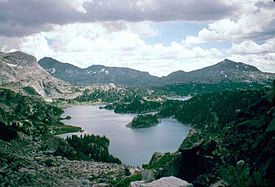Wilderness
The examples and perspective in this article may not represent a worldwide view of the subject. |
- Wilderness is also the name of a city in South Africa and a band.
Wilderness is generally defined as a natural environment on Earth that has not been modified by human activity. Ecologists consider wilderness areas to be an integral part of the planet's self-sustaining natural ecosystem (the biosphere).

The word, "wilderness", derives from the notion of wildness; in other words that which is not controllable by humans. The word's etymology is from the Old English wildeornes, which in turn derives from wildeor meaning wild beast (wild + deor = beast, deer) (The Collins English Dictionary, 2000). From this point of view, it is the wildness of a place that makes it a wilderness. The mere presence or activity of people does not disqualify an area from wilderness status. Many wilderness areas have historically been inhabited or influenced by activities of people.
Wilderness has come to have more formal definitions.
History
For most of human history, the greater part of the Earth's terrain was wilderness, and human attention was concentrated in settled areas. However, during the 19th century it became clear that in many countries wild areas had either disappeared or were in danger of disappearing. This realisation gave rise to the conservation movement in the USA, partly through the efforts of writers and activists such as John Burroughs and John Muir, and politicians such as U.S. President Teddy Roosevelt).

The creation of National Parks, beginning in the 19th century, was sufficient to preserve some especially attractive or notable areas, but the pursuits of commerce, lifestyle, and recreation combined with increases in human population have continued to result in human modification of relatively untouched areas. In the 20th century the concept of wilderness areas has been more formally defined and in these areas human activity and modifications are highly restricted. Nevertheless, as awareness of the ecological need for wilderness areas has grown, so too have the ongoing perceived development needs of humankind expanded.
Accessibility
Making wilderness environments accessible for disabled individuals was initiated in 1986 in the USA. A nonprofit organization adopted such a mission and constructed a model wilderness-access facility in Colorado, USA. It includes a mile-long boardwalk through a pristine area on the continental divide of North America [1].
See also
- Topics
- Adventure tourism
- Camping
- Conservation movement
- Deforestation
- Ecological footprint
- Environmental education
- Hiking
- National Wilderness Preservation System
- Nature
- Outdoor education
- Park ranger
- Planetary habitability
- Wilderness Act
- People
- Tom Brown
- Ernest Callenbach
- Aldo Leopold
- Bob Marshall
- John Muir
- Sigurd F. Olson
- Dr. Ian Player
- Gary Snyder
- Henry David Thoreau
External links
Definitional
- What is Wilderness? - Definition & discussion of wilderness as a human construction
- Wilderness and the American Mind - by Roderick Nash
- The Meaning of Wilderness - by Sandy Schuman
Organisations
- Montana Wilderness Association
- The Wilderness Act of 1964, USA
- World Wilderness Congress
- Wilderness Foundation SA
- Wilderness Foundation UK
- PrimalNature.org - Preservation and restoration of old-growth forests in the eastern United States
- Yggdrasil Institute - A project of Earth Island Institute
